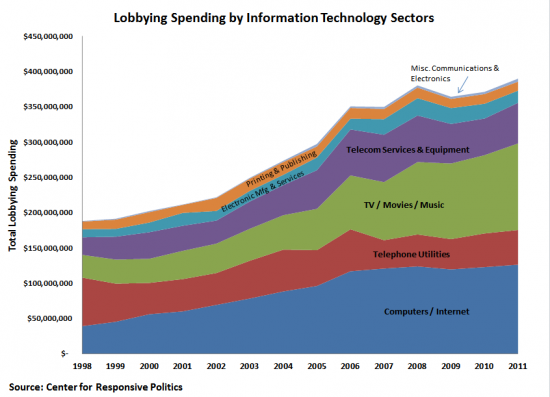I’ve come across another example of the kind of thinking and rhetoric on copyright that claims to be conservatives and libertarian, but which really does not serve the cause. I’m loathe to bring attention to it, but I think it’s important to start to renounce the kind of view that are often ascribed to conservatives and libertarians, but which don’t serve us and which only a tiny minority of us hold.
The piece in question is by Scott Cleland and it’s entitled “The Copyright Education of Mr. Khanna,” and like Tom Giovanetti before him, Cleland attacks Derek Khanna for his RSC policy brief. Cleland posits “five fundamental flaws” in Khanna’s argument. The first one is inscrutable, but if I can make out an argument it’s that Khanna is wrong because he’s questioning our existing copyright regime. I don’t see how questioning the status quo can make your argument flawed.
The second “fundamental flaw” Cleland points out is that “Mr. Khanna’s copyright views are not conservative.” He echoes Giovanetti by not addressing the merits of Khanna’s arguments but merely saying that if Khanna is agreeing with folks who are on the left, then there must be something with his argument. Cleland writes,
Mr. Khanna’s copyright views actually closely parrot the collectivist views of the famous Professor Larry Lessig who founded Free Culture and Creative Commons, championed Free Software and CopyLeft, and called for convening a new Constitutional Convention because “Democracy in America is stalled” by the “corruption” of money in politics.
It is also important to note that Marx and Engels said their theory could be summed up in one sentence: “Abolition of property.”
Do you see what just happened there? It’s the worst kind of guilt by association. First, while Khanna’s conclusions match Lessig’s, it’s not clear his reasoning can’t be distinguished. I know I can certainly distinguish my reasoning from Lessig’s in many instances. Folks on the left are more interested in equity, while libertarians are more interested in liberty and economic efficiency. The fact that we coincide on our conclusions on copyright should tell us that there’s something really wrong with out current system, not that we’re not “real conservatives.”
But never mind that, Cleland tries to link Khanna not just to Lessig’s views on copyright, but to his views on money in politics. And if that was not enough, there’s a non-sequitur about Marx and Engels and abolition of property to really drive the character assassination home.
The third flaw Cleland points out is that Khanna refers to copyright as a monopoly. This is wrong, Cleland says, because property can’t be a monopoly; after all, we don’t say you have a monopoly over your car, he says. He is right that the word monopoly is often misused, but the fact is that copyright, in an economic sense, is a grant of monopoly. In a world without copyright, creative expressions are non-rivalrous and non-excludable, unlike cars. We establish copyright in order to make expressions excludable. That is, we give creators market power where they had none before so that they may charge above marginal cost and thus have an incentive to create more than they otherwise would.
The fourth “flaw” that Cleland points out I can’t disagree with. It’s Khanna’s sentence, “Copyright violates every tenet of laissez faire capitalism.” I don’t think that’s right as written, but I also think Khanna wrote that for effect. Our current copyright system (as opposed to copyright as an idea) is certainly more crony capitalist than laissez faire capitalist.
Fifth, and finally, Cleland says that “Copyright is law not regulation.” Actually, as I pointed out in my last post, important parts of copyright are indeed administered through notice-and-comment regulation by the Copyright Office, not courts.
“In sum,” Cleland writes, “Mr. Khanna is promoting Lessigian anti-property thinking (that more American innovation and progress will emanate from the utopian altruism of a property-less system, where taking what others produce without permission is called ‘sharing),’ as superior to America’s Constitutional political and economic system of property and economic incentives.” This kind of rhetoric is exactly what has come from the more desperate and captured parts of the GOP for quite some time, and it should change for the sake of the GOP. It does not address the merits of arguments but instead tries to tar and feather innovative thinkers by asserting that if you’re for copyright reform then you must be against property, and thus a communist.
Don’t buy it folks. Criticism of our current copyright regime fits perfectly within an ideology that respects property rights. This is something that we make quite clear in our forthcoming book on copyright from a libertarian and conservative perspective. Khanna’s memo proposed a system that would grant authors a copyright term of 46 years. I don’t see how that is a “property-less system.”




 The Technology Liberation Front is the tech policy blog dedicated to keeping politicians' hands off the 'net and everything else related to technology.
The Technology Liberation Front is the tech policy blog dedicated to keeping politicians' hands off the 'net and everything else related to technology.